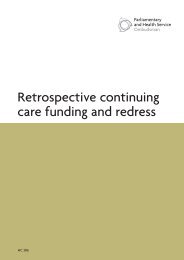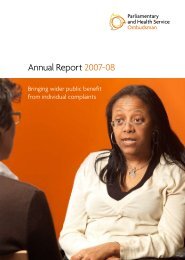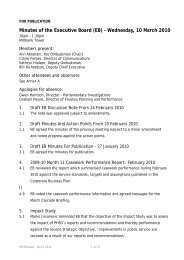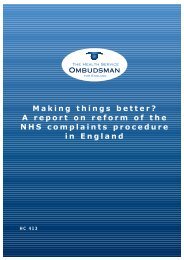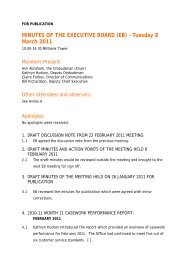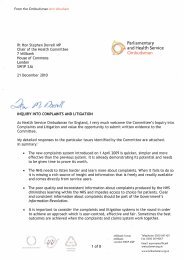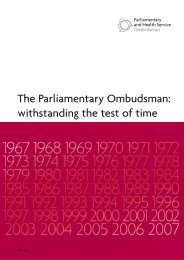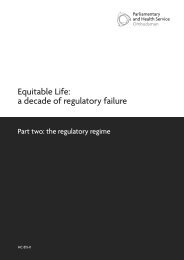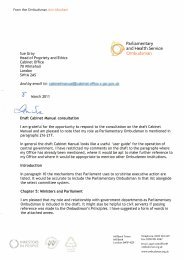Putting things right: complaints and learning from DWP - the ...
Putting things right: complaints and learning from DWP - the ...
Putting things right: complaints and learning from DWP - the ...
You also want an ePaper? Increase the reach of your titles
YUMPU automatically turns print PDFs into web optimized ePapers that Google loves.
Mr J’s complaint about <strong>the</strong> Child Support Agency<br />
The Child Support Agency caused Mr J distress, affecting his relationship with his family <strong>and</strong> partner,<br />
because <strong>the</strong>y failed to remove his details <strong>from</strong> <strong>the</strong>ir computer system when <strong>the</strong>y found that he was not<br />
<strong>the</strong> man <strong>the</strong>y were looking for. They failed to ‘put <strong>things</strong> <strong>right</strong>’ fully for more than four years.<br />
Background to <strong>the</strong> complaint<br />
In August 2003 <strong>the</strong> Child Support Agency (<strong>the</strong><br />
Agency) received a maintenance application form.<br />
In October <strong>the</strong> Agency sent Mr J a maintenance<br />
enquiry form, believing him to be <strong>the</strong> non-resident<br />
parent. (In tracing <strong>the</strong> non‐resident parent <strong>the</strong><br />
Agency apparently chose an ‘incorrect entry’ <strong>and</strong><br />
wrongly identified Mr J.) Mr J did not know <strong>and</strong><br />
had not had a relationship with <strong>the</strong> person with<br />
whom <strong>the</strong> Agency claimed he had had a child.<br />
He telephoned <strong>the</strong> Agency <strong>and</strong> was assured <strong>the</strong>y<br />
would put <strong>things</strong> <strong>right</strong>. Despite that, <strong>the</strong> Agency<br />
asked Mr J’s employer about his earnings <strong>and</strong> issued<br />
a child support maintenance calculation.<br />
In December 2003 <strong>the</strong> Agency confirmed that Mr J<br />
was not <strong>the</strong> non‐resident parent <strong>and</strong> referred <strong>the</strong><br />
case to a specialist team to remove his details <strong>from</strong><br />
<strong>the</strong>ir system. An ‘incident number’ was raised but<br />
no fur<strong>the</strong>r action was taken. (The Agency told us<br />
that a National Insurance number removal form<br />
should have been completed <strong>and</strong> sent to <strong>the</strong> team,<br />
but <strong>the</strong>y were unable to confirm if that was done.<br />
As no note was made on <strong>the</strong> system to tell officers<br />
that Mr J was not <strong>the</strong> non-resident parent, his<br />
details were not removed.) The Agency awarded<br />
Mr J compensation of £100.<br />
On 18 December 2006 <strong>the</strong> Agency sent Mr J two<br />
letters: one dem<strong>and</strong>ed immediate payment of<br />
£3,498 arrears; <strong>the</strong> o<strong>the</strong>r said that a maintenance<br />
payment of £144 was overdue. Mr J was ‘mortified<br />
<strong>and</strong> extremely upset’ to receive letters <strong>from</strong><br />
<strong>the</strong> Agency again. He rang <strong>the</strong> Agency <strong>and</strong> was<br />
promised a call back, which he did not receive.<br />
On 21 December <strong>the</strong> Agency sent Mr J a letter<br />
saying <strong>the</strong>y would collect <strong>the</strong> maintenance<br />
through a deduction <strong>from</strong> earnings order. Mr J<br />
telephoned <strong>the</strong>m on 28 December to explain<br />
<strong>the</strong>y had previously accepted that he was not <strong>the</strong><br />
non‐resident parent. The Agency told us this was<br />
<strong>the</strong> first time <strong>the</strong>y identified that <strong>the</strong> action taken<br />
in 2003 to remove Mr J’s details had not worked.<br />
No one returned Mr J’s call.<br />
On 19 January 2007 <strong>the</strong> Agency wrote to tell Mr J<br />
that he owed arrears of £5,544, <strong>and</strong> that unless he<br />
made arrangements to pay, <strong>the</strong>y would involve<br />
a debt collection agency. Mr J telephoned <strong>the</strong><br />
Agency, but <strong>the</strong>y did not call him back. In February,<br />
after <strong>the</strong> Agency had imposed a deduction<br />
<strong>from</strong> earnings order, Mr J’s employer deducted<br />
£213.36 <strong>from</strong> his wages (£212.36 for maintenance<br />
<strong>and</strong> arrears, <strong>and</strong> a £1 administration fee). Mr J<br />
telephoned <strong>the</strong> Agency on 15 February, <strong>and</strong> again<br />
explained <strong>the</strong> history of his dealings with <strong>the</strong>m. He<br />
asked to be called back. He telephoned again on<br />
16 February, saying he was unhappy that no one had<br />
called him back <strong>and</strong> reiterating that he was not <strong>the</strong><br />
non‐resident parent. Mr J did not receive <strong>the</strong> call<br />
back he had requested.<br />
On 20 February 2007 Mr J telephoned <strong>the</strong> Agency<br />
<strong>and</strong> was told that <strong>the</strong> debt collection agency had<br />
been asked not to take any fur<strong>the</strong>r action. The next<br />
day <strong>the</strong> Agency’s solicitors wrote to Mr J, saying<br />
that his failure to respond to an earlier letter <strong>from</strong><br />
<strong>the</strong>m left <strong>the</strong> Agency no alternative but to take<br />
enforcement action. They intended to apply for<br />
a deduction <strong>from</strong> earnings order unless he paid<br />
£5,610 by 28 February.<br />
48 <strong>Putting</strong> <strong>things</strong> <strong>right</strong>: <strong>complaints</strong> <strong>and</strong> <strong>learning</strong> <strong>from</strong> <strong>DWP</strong> | March 2009



